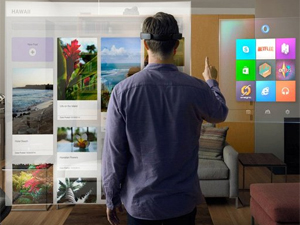



Date:22/04/17
 Lightweight glasses that will improve our memory will become our everyday computing device by 2022, according to a Facebook scientist.
Lightweight glasses that will improve our memory will become our everyday computing device by 2022, according to a Facebook scientist.
Michael Abrash, the chief scientist of Facebook-owned Oculus Research, said augmented reality (AR) glasses will take over from smartphones in the next five years.
They will augment our current reality and will make us 'smarter and more capable', according to the chief scientist.
Glasses will provide us with virtual information all the time such as finding out the temperature of something just by looking at it, claimed Abrash at Facebook's annual developer conference in San Jose on Wednesday.
They will also be able to mute annoying background conversation and and instantly translate foreign languages.
The chief scientist said he hoped to developed a device that 'enhances your vision and hearing seamlessly, that makes you smarter and more capable, that is light, comfortable, stylish, power efficient and socially acceptable enough to accompany you everywhere you go.'
Abrash believes 2022 will be the year when 'widespread, glasses-based augmented reality' becomes the new normal.
'Even once we're on that ramp it will take may years to fully realise AR's potential, just as it took decades for human oriented computing to mature and reach billions of people,' he said.
Although he predicts they will be widely available by 2022, scientists will need another decade or two for these glasses to have the advanced optics and displays, writes Business Insider.
'Twenty or 30 years from now, I predict that instead of carrying stylish smartphones everywhere, we'll wear stylish glasses. Those glasses will offer VR, AR and everything in between and we'll use them all day,' he said.
Google Glass was one of the first attempts at glasses that doubled up as computers but was widely deemed to be a failure.
It consisted of a head-mounted display that was fashioned to look like a pair of eyeglasses and would display information in a smartphone-like manner.
However, it seemed the public wasn't ready for the futuristic device and Google halted sales in 2015.
The Google Glass was surrounded by controversy, as the public galled wearer's 'glassholes' and news surfaced that users could steal personal data from others around them.
Augmented reality glasses will replace smartphones in 2022
 Lightweight glasses that will improve our memory will become our everyday computing device by 2022, according to a Facebook scientist.
Lightweight glasses that will improve our memory will become our everyday computing device by 2022, according to a Facebook scientist.Michael Abrash, the chief scientist of Facebook-owned Oculus Research, said augmented reality (AR) glasses will take over from smartphones in the next five years.
They will augment our current reality and will make us 'smarter and more capable', according to the chief scientist.
Glasses will provide us with virtual information all the time such as finding out the temperature of something just by looking at it, claimed Abrash at Facebook's annual developer conference in San Jose on Wednesday.
They will also be able to mute annoying background conversation and and instantly translate foreign languages.
The chief scientist said he hoped to developed a device that 'enhances your vision and hearing seamlessly, that makes you smarter and more capable, that is light, comfortable, stylish, power efficient and socially acceptable enough to accompany you everywhere you go.'
Abrash believes 2022 will be the year when 'widespread, glasses-based augmented reality' becomes the new normal.
'Even once we're on that ramp it will take may years to fully realise AR's potential, just as it took decades for human oriented computing to mature and reach billions of people,' he said.
Although he predicts they will be widely available by 2022, scientists will need another decade or two for these glasses to have the advanced optics and displays, writes Business Insider.
'Twenty or 30 years from now, I predict that instead of carrying stylish smartphones everywhere, we'll wear stylish glasses. Those glasses will offer VR, AR and everything in between and we'll use them all day,' he said.
Google Glass was one of the first attempts at glasses that doubled up as computers but was widely deemed to be a failure.
It consisted of a head-mounted display that was fashioned to look like a pair of eyeglasses and would display information in a smartphone-like manner.
However, it seemed the public wasn't ready for the futuristic device and Google halted sales in 2015.
The Google Glass was surrounded by controversy, as the public galled wearer's 'glassholes' and news surfaced that users could steal personal data from others around them.
Views: 356
©ictnews.az. All rights reserved.Similar news
- Azerbaijani project to monitor disease via mobile phones
- Innovative educational system to be improved under presidential decree
- NTRC prolongs license of two TV and radio organizations for 6 years
- Azerbaijan establishes e-registry for medicines
- Azerbaijani museum introduces e-guide
- Nar Mobile opens “Nar Dunyasi” sales and service center in Siyazan city
- International conference on custom electronic services held in Baku
- OIC secretary general to attend COMSTECH meeting in Baku
- Azerbaijan develops earthquake warning system
- New law to regulate transition to digital broadcasting in Azerbaijan
- Azerbaijani State Social Protection Fund introduces electronic digital signature
- Intellectual traffic management system in Baku to be commissioned in December
- Tax Ministry of Azerbaijan started receiving video-addresses
- World Bank recommends Azerbaijan to speed up e-service introduction in real estate
- Azerbaijan to shift to electronic registration of real estate





















